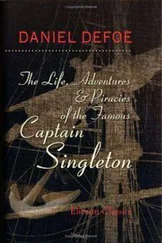Daniel Defoe - The History and Remarkable Life of the Truly Honourable Colonel Jacque, Commonly called Colonel Jack
Здесь есть возможность читать онлайн «Daniel Defoe - The History and Remarkable Life of the Truly Honourable Colonel Jacque, Commonly called Colonel Jack» — ознакомительный отрывок электронной книги совершенно бесплатно, а после прочтения отрывка купить полную версию. В некоторых случаях можно слушать аудио, скачать через торрент в формате fb2 и присутствует краткое содержание. Жанр: foreign_prose, на английском языке. Описание произведения, (предисловие) а так же отзывы посетителей доступны на портале библиотеки ЛибКат.
- Название:The History and Remarkable Life of the Truly Honourable Colonel Jacque, Commonly called Colonel Jack
- Автор:
- Жанр:
- Год:неизвестен
- ISBN:нет данных
- Рейтинг книги:4 / 5. Голосов: 1
-
Избранное:Добавить в избранное
- Отзывы:
-
Ваша оценка:
- 80
- 1
- 2
- 3
- 4
- 5
The History and Remarkable Life of the Truly Honourable Colonel Jacque, Commonly called Colonel Jack: краткое содержание, описание и аннотация
Предлагаем к чтению аннотацию, описание, краткое содержание или предисловие (зависит от того, что написал сам автор книги «The History and Remarkable Life of the Truly Honourable Colonel Jacque, Commonly called Colonel Jack»). Если вы не нашли необходимую информацию о книге — напишите в комментариях, мы постараемся отыскать её.
The History and Remarkable Life of the Truly Honourable Colonel Jacque, Commonly called Colonel Jack — читать онлайн ознакомительный отрывок
Ниже представлен текст книги, разбитый по страницам. Система сохранения места последней прочитанной страницы, позволяет с удобством читать онлайн бесплатно книгу «The History and Remarkable Life of the Truly Honourable Colonel Jacque, Commonly called Colonel Jack», без необходимости каждый раз заново искать на чём Вы остановились. Поставьте закладку, и сможете в любой момент перейти на страницу, на которой закончили чтение.
Интервал:
Закладка:
On the first of August, 1700, according to his statement, there appeared "a vile abhorred pamphlet, in very ill verse, written by one Mr. Tutchin, and called The Foreigners ; in which the author.. fell personally upon the King himself, and then upon the Dutch Nation. And after having reproached his Majesty with crimes that his worst enemy could not think of without horror, he sums up all in the odious name of Foreigner . This filled me with a kind of rage against the book, and gave birth to a trifle which I never could hope should have met with so general an acceptance as it did; I mean The True-Born Englishman ."
The reason for Tutchin's pamphlet was that William III., never loved by the English, became less and less popular after the death of Queen Mary. A Dutchman, he was supposed to have the interests of Holland more at heart than those of England. This supposition was strengthened by the fact that he took no Englishmen into his confidence as he did his old and trusted Dutch friends. These, naturally, shared his unpopularity, especially the Duke of Schomberg and the King's favourite minister, William Bentinck, created Earl of Portland, both of whom are mentioned by Defoe in his True-Born Englishman .
Defoe, in this reply to Tutchin's pamphlet, sought to prove that the king and his foreign friends had as good right to the esteem of the English as any patriots in the history of the country. In the first part of the "poem," as Defoe called his satire, he showed that William, with his Dutch blood, was as much entitled to the name of Englishman as any of his subjects, who came of mixed British, Pictish, Roman, Saxon, Danish, and Norman blood. In short, Defoe made the English out a hybrid race, and with excellent good sense showed that their national vigour was due largely to their being so. Much of what he said might well be said to-day of the people of the United States, as for instance, the following from Defoe's explanatory preface: -
"The multitudes of foreign nations who have taken sanctuary here, have been the greatest additions to the wealth and strength of the nation; the essential whereof is the number of its inhabitants. Nor would this nation ever have arrived to the degree of wealth and glory it now boasts of, if the addition of foreign nations.. had not been helpful to it. This is so plain, that he who is ignorant of it is too dull to be talked with."
The other side to Defoe's picture (and there was another side then as now) is shown in verses which, with a few changes, would likewise be applicable to the United States to-day. Defoe is trying to prove that even with lapse of years the English race remains hybrid.
"And lest by length of time it be pretended The climate may this modern breed have mended, Wise Providence, to keep us where we are, Mixes us daily with exceeding care. We have been Europe's sink, the jakes where she Voids all her offal outcast progeny. From our fifth Henry's time, the strolling bands Of banish'd fugitives from neighb'ring lands Have here a certain sanctuary found: Th' eternal refuge of the vagabond, Where, in but half a common age of time, Borr'wing new blood and manners from the clime, Proudly they learn all mankind to contemn, And all their race are true-born Englishmen."
In the second part of the satire, Defoe tries to describe the nature of the English, their pride, and their ingratitude to their benefactors. Among the stanzas in which he hits off the faults of his countrymen, the following, more true than grammatical, is among the most forcible: -
"Surly to strangers, froward to their friend; Submit to love with a reluctant mind; Resolved to be ungrateful and unkind. If by necessity reduced to ask, The giver has the difficultest task; For what's bestow'd they awkwardly receive, And always take less freely than they give. The obligation is their highest grief; And never love, where they accept relief. So sullen in their sorrows, that 'tis known, They'll rather die than their afflictions own: And if relieved, it is too often true, That they'll abuse their benefactors too; For in distress their haughty stomach's such, They hate to see themselves obliged too much, Seldom contented, often in the wrong; Hard to be pleased at all, and never long."
Defoe's satire was a success. Written, as it is, in rough verse, at times little better than doggerel, it is yet always vigorous and interesting. To-day, after a lapse of two hundred years, no verse from Defoe's pen is so readable. That it was effective in accomplishing the purpose for which it was composed, is proved by the fact that the people, taking the satire good-naturedly, experienced a revulsion of feeling towards the king and his Dutch friends. It was natural that the piece should bring Defoe the increased regard of the king, whose favour he had already to some extent enjoyed. "This poem was the occasion of my being known to His Majesty," Defoe wrote in his Appeal to Honour and Justice ; and "I was afterwards received by him."
Concluding the second volume of Colonel Jacque will be found the ironical Shortest Way with the Dissenters , which placed Defoe in the pillory and in prison. It was written in 1702, the first year of Anne's reign, when the strong Tory influence in the government seemed likely to bring back the persecution of Nonconformists which had ceased in the time of William. From the early summer, when Dr. Sacheverell preached at Oxford a most inflammatory sermon against the Dissenters, High Church feeling against them grew stronger and stronger. Finally Defoe decided that the best service he could render them was to show the views of the High Church party in all their extreme savageness. The result was the pamphlet, The Shortest Way with the Dissenters; or, Proposals for the Establishment of the Church , which appeared on the first of December, 1702.
Defoe was so successful in imagining High Tory sentiments in his pamphlet, that it was received with indignation by the Dissenters themselves and with acclaim by the extreme Churchmen. "I join with" the author "in all he says," wrote one of them, 3 3 : Defoe mentions the letter in his Review for August 11th, 1705.
to a friend who had sent him the pamphlet, "and have such a value for the book, that, next to the Holy Bible and the sacred Comments, I take it for the most valuable piece I have." Naturally there was a storm when the truth was discovered and the High Tories found out that what they had praised was ironical. They were immediately shamed into declaring the pamphlet a dangerous libel, intended to stir up the Dissenters to civil war. Defoe's bookseller and printer were accordingly arrested, and a reward was offered for his apprehension. He gave himself up, was tried, and sentenced to pay a fine of two hundred marks, to stand three times in the pillory, and to go to prison for the Queen's pleasure. How Defoe converted his punishment in the pillory into a triumph, and how profitably he employed his time during his imprisonment, have been already told in the introduction to Robinson Crusoe .
AUTHOR'S PREFACE
Sir, – It is so customary to write prefaces to all books of this kind, to introduce them with the more advantage into the world, that I cannot omit it, though on that account 'tis thought this work needs a preface less than any that ever went before it. The pleasant and delightful part speaks for itself; the useful and instructive is so large, and capable of so many improvements, that it would employ a book large as itself to make improvements suitable to the vast variety of the subject.
Here's room for just and copious observations on the blessings and advantages of a sober and well-governed education, and the ruin of so many thousands of youths of all kinds in this nation for want of it; also, how much public schools and charities might be improved to prevent the destruction of so, many unhappy children as in this town are every year bred up for the gallows.
Читать дальшеИнтервал:
Закладка:
Похожие книги на «The History and Remarkable Life of the Truly Honourable Colonel Jacque, Commonly called Colonel Jack»
Представляем Вашему вниманию похожие книги на «The History and Remarkable Life of the Truly Honourable Colonel Jacque, Commonly called Colonel Jack» списком для выбора. Мы отобрали схожую по названию и смыслу литературу в надежде предоставить читателям больше вариантов отыскать новые, интересные, ещё непрочитанные произведения.
Обсуждение, отзывы о книге «The History and Remarkable Life of the Truly Honourable Colonel Jacque, Commonly called Colonel Jack» и просто собственные мнения читателей. Оставьте ваши комментарии, напишите, что Вы думаете о произведении, его смысле или главных героях. Укажите что конкретно понравилось, а что нет, и почему Вы так считаете.












